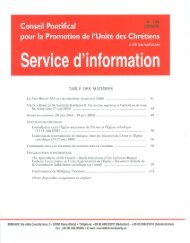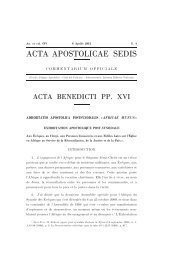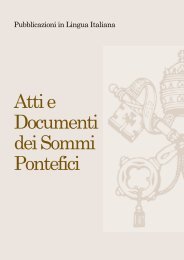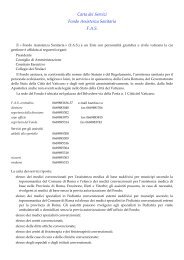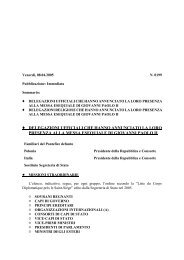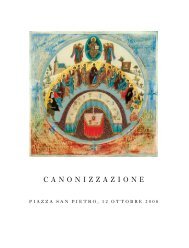ACTA APOSTOLICAE SEDIS - La Santa Sede
ACTA APOSTOLICAE SEDIS - La Santa Sede
ACTA APOSTOLICAE SEDIS - La Santa Sede
Erfolgreiche ePaper selbst erstellen
Machen Sie aus Ihren PDF Publikationen ein blätterbares Flipbook mit unserer einzigartigen Google optimierten e-Paper Software.
Acta Benedicti Pp.XVI 697<br />
cannot be purely and simply applied to the Church” and goes on to state: “I am<br />
making it absolutely clear that when it comes to the protection of the children of<br />
this State, the standards of conduct which the Church deems appropriate to itself,<br />
cannot and will not, be applied to the workings of democracy and civil society in<br />
this republic.Not purely, or simply or otherwise.”<br />
The quotation in question is taken from the Instruction on the Ecclesial<br />
Vocation of the Theologian, otherwise known as Donum Veritatis (The Gift of the<br />
Truth), published by the Congregation for the Doctrine of the Faith on 24<br />
May 1990, and signed by the then Prefect and Secretary of the Congregation.<br />
It is not a private text of the then Cardinal Ratzinger but an official document<br />
of the Congregation. This document is concerned with the theologian’s<br />
service to the Church community, a service which can also be of help to<br />
society at large, and not with the manner in which the Church should behave<br />
within a democratic society nor with issues of child protection, as Mr Kenny’s<br />
use of the quotation would seem to imply.<br />
As a basic methodological principle, a quotation extracted from a given<br />
text can be correctly understood only when it is interpreted in the light of its<br />
context. The quotation used by Mr Kenny is taken from paragraph 39 of the<br />
Instruction, which reads: “The Church, which has her origin in the unity of the<br />
Father, Son, and Holy Spirit, is a mystery of communion.In accordance with the<br />
will of her founder, she is organized around a hierarchy established for the service<br />
of the Gospel and the People of God who live by it.After the pattern of the members<br />
of the first community, all the baptized with their own proper charisms are to<br />
strive with sincere hearts for a harmonious unity in doctrine, life, and worship<br />
(cfr. Acts 2: 42). This is a rule which flows from the very being of the Church.For<br />
this reason, standards of conduct, appropriate to civil society or the workings of a<br />
democracy, cannot be purely and simply applied to the Church.Even less can<br />
relationships within the Church be inspired by the mentality of the world around<br />
it (cfr.Rom 12: 2). Polling public opinion to determine the proper thing to think<br />
or do, opposing the Magisterium by exerting the pressure of public opinion,<br />
making the excuse of a ‘consensus’ among theologians, maintaining that the<br />
theologian is the prophetical spokesman of a ‘base’ or autonomous community<br />
which would be the source of all truth, all this indicates a grave loss of the sense of<br />
truth and of the sense of the Church.”<br />
This text rejects a trend among some contemporary theologians to treat<br />
the Church’s teaching as though it were the product of public debate, to<br />
dissent from “official teaching” and to impose their opinions on the faithful



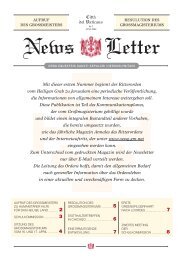
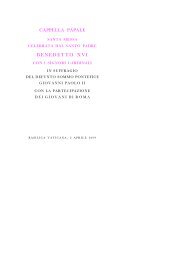
![AAS 01 [1909] - La Santa Sede](https://img.yumpu.com/51456523/1/180x260/aas-01-1909-la-santa-sede.jpg?quality=85)
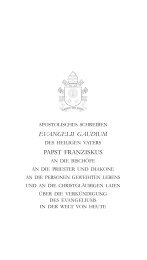
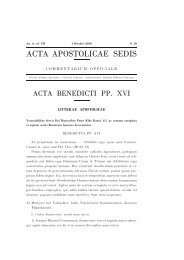
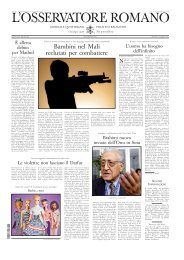
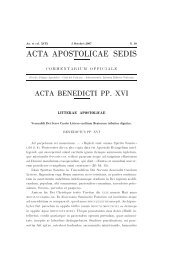
![AAS 20 [1928] - La Santa Sede](https://img.yumpu.com/19772818/1/180x260/aas-20-1928-la-santa-sede.jpg?quality=85)
